Become a member of an IPEd branch.
IPEd’s seven branches
Individual editors, or those interested in the profession, can become members of IPEd. When they apply for membership, they will be asked to nominate a branch they would like to be affiliated with.
IPEd has the following broad aims:
- promoting editors and editing
- fostering excellence in professional editing standards
- providing training and professional development to editors
- allowing editors to exchange ideas and disseminate information
- acting as a link between their members and organisations or individuals seeking editorial help.
The branches of IPEd are the following:
To contact the branch closest to you, click on their name above to find more information, or go to the contact us page.
Check news and events for information about branch activities.
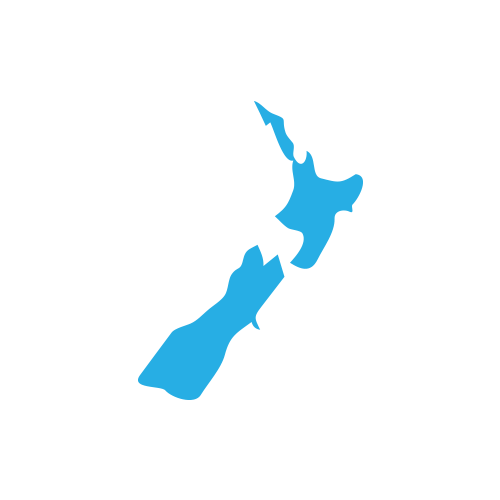
Editors Aotearoa New Zealand
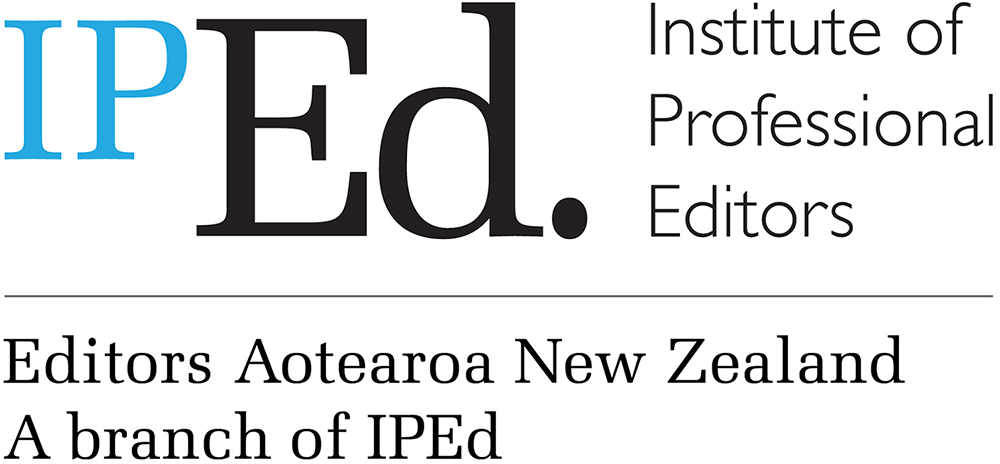
Welcome to Editors Aotearoa New Zealand (EdANZ), the newest branch of the Institute of Professional Editors (IPEd).
The Institute of Professional Editors Ltd is the professional association for Australian and New Zealand editors. We exist to advance the profession of editing by planning and implementing activities that support our members.
Editors Aotearoa New Zealand offers a range of benefits to its members:
- branch meetings via Zoom on an area of professional development
- a monthly IPEd newsletter, Gatherings, with links to New Zealand content
- training sessions, either at a physical location and/or via remote access
- four local sub-groups that enable face-to-face meetings and networking
- a private Facebook group to allow informal discussion.
We have an enthusiastic membership and a willing committee. The committee is elected each year according to the IPEd constitution. The current committee will remain in post until October 2021.
If you are interested in joining EdANZ, please read more on the IPEd Become a Member page.
The committee is:
Executive group:
President – Deborah Shaw
Secretary – Juanita Nieuwoudt
Budget Officer – Rina Wongpanich
Committee members:
Training Officer – Vacant
Outreach – Vacant
Social Media – Vacant
Membership – Joan Gladwyn
Newsletters – Jane Matthews
Ex-officio committee members are:
IPEd Board Director – Vacant
Accreditation Board Delegate – Elizabeth Beattie
As an IPEd member you can:
- access professional development programs across Australia and New Zealand, through workshops offered by branches and online, including workshops for accreditation candidates
- advertise your services via the Editors Directory (for Professional Members only)
- receive discounts on registration fees for:
- professional development provided by any branch
- IPEd editors conference, held every two years from 2021
- the accreditation exam
- training events, including webinars held by our international partners, such as the Chartered Institute of Editing and Proofreading (CIEP) in the UK and Editors Canada.
- receive discounts on numerous products and services, such as:
- the Macquarie Dictionary
- Books+Publishing
- Weekly Book Newsletter
- PerfectIt
- the Australian Manual of Scientific Style, and more
- receive job advertisements and industry news via regular email communication and newsletters
- find out about editing prizes and scholarship opportunities
- access member-only resources, such as book lists and articles about editing.
As a member of IPEd you will have the support of an organisation of Australian and New Zealand editors that advocates for issues such as rates of pay and employment conditions, and works to raise the profile of editors across all industry sectors.
Apply for membership here.
Editors Directory
The Editors Directory (ED) is a directory of freelance editors. All Professional Members are eligible to subscribe for an entry in the ED. To create a new entry in the ED, email secretary@iped-editors.org in the first instance. Once an editor has subscribed to the directory, they will be asked to complete additional details for online listing. The fee for this is AUD60 per year and can be paid through the IPEd member portal.
Reciprocal Membership
IPEd has a reciprocal membership agreement with the Chartered Institute of Editing and Proofreading (CIEP) in the UK that allows our Accredited Editors (AEs) and Distinguished Editors (DEs) to apply for CIEP professional membership without the need to fulfil their other criteria, and vice versa.
IPEd also has a reciprocal membership agreement with Editors Canada and the US-based Editorial Freelancers Association (EFA), allowing members of IPEd to register for Editors Canada and EFA conferences, webinars and online training at the same price as Editors Canada or EFA members, and vice versa.
EdANZ in Gatherings

Editors New South Wales
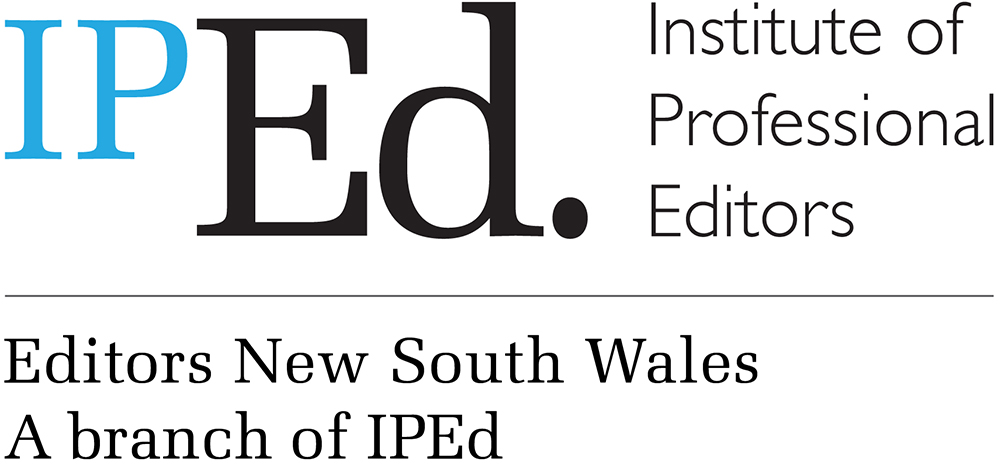
Editors NSW is the New South Wales branch of the Institute of Professional Editors. A list of our committee members is in the committee tab.
Branch members include freelance and in-house editors working on books, journals, magazines and corporate and public sector productions, as well as indexers, proofreaders, writers, translators, and others, among whom the common bond is a dedication to language and effective communication.
The branch meets on the first Tuesday of every month except January. All branch meetings are held online, other than our two social dinners, which are held in Sydney in July and December each year.
Branch members are emailed regularly about meetings and other activities, including workshops. If you are not receiving your reminder of the monthly meeting, please email ednsw.admin@iped-editors.org.
A history of the Editors NSW branch can be found in the History tab.
President
Vacant
Oversees governance of the branch according to IPEd rules, chairs committee meetings and Annual Branch Meetings, and represents the branch as required.
Vice-President
Vacant
In the absence of the President, chairs meetings and assumes the other duties of the President.
Secretary
Marita Smith
Maintains the records of the branch, takes minutes of committee meetings and undertakes administrative tasks for annual branch meetings.
Budget Officer
Russell Noakes
Prepares and oversees the branch budget, and authorises branch expenditure.
News Editor
Elisabeth Thomas
Edits and manages production of items for the IPEd newsletter, Gatherings.
News Writer
Carolyn Page
Write monthly reports on branch events and the work of the committee for Gatherings.
Professional Development Officer
Kiara Thomas
Participate in the work of the Standing Committee for Professional Development and arrange and schedule branch workshops.
Presentations Coordinator
Jennifer Rowland
Arranges and schedules speakers for online presentations.
Zoom Support Assistants
Emmanuelle Botté
Assist with the running of online events.
Networking Coordinator
Ruth Power
Arranges members’ networking events.
General support
Vacant
Ex officio
IPEd Director (NSW)
Justine Dixon Cooper AE
Accreditation Board delegate (NSW)
Dr Louise Merrington AE
Society of Editors (NSW) Inc.
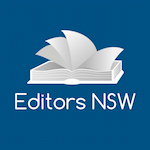
In 1978, seven Sydney editors (Bruce Champion, George Morrison, Jim Robins, Gil Teague, Barbara Ker Wilson, Jacquie Kent and Elaine Russell) gathered to discuss the idea of forming a society called ‘The Editors’. The purpose of this society was twofold: to maintain and develop standards of editorial skills and at the same time to promote the exchange of ideas among editors. An interim committee was formed, a constitution drafted and 75 editors attended the first meeting at a venue called Julie’s Swiss Inn, in Sussex Street in the Sydney CBD. The first annual general meeting was on 16 May 1979 and the interim committee members were confirmed in their positions.
The idea was a good one, and ‘The Editors’ grew steadily from these not-so-humble beginnings. Its list of members, patrons and guest speakers over the years has included some of New South Wales’ most admired and respected editors, authors and public figures, such as Hazel Hawke, Beatrice Davis and Jon Cleary.
The society’s constitution stated that membership would be open to anyone engaged full-time in any aspect of book editing, any self-employed book editor and to any former editor in either of those categories. These ideas and objectives were expressed in the first society newsletter, and embodied in society activities such as:
- developing and valuing affiliations with other editors’ societies and overseas groups
- establishing a freelance register
- conducting courses to develop editing skills.
The first professional development meeting was held at the Kirribilli Neighbourhood Centre in Fitzroy Street in North Sydney. Meetings of society members later become a monthly fixture at the Sydney Mechanics’ School of Arts at 280 Pitt Street, Sydney.
Following that first meeting in 1978, there were 70 financial members of the society. A few months later, by the annual general meeting, there were 86. In 1986, the original and economical name of the society, ‘The Editors’, became the ‘Society of Editors (NSW) Inc.’
By 2015, the membership had grown to more than 350. In this year, the society’s members voted to become a branch of the national editors’ peak body, the Institute of Professional Editors (IPEd). In 2016, the society was wound down and replaced by ‘Editors NSW, a branch of IPEd’. As a result of this transition, which became official on 1 July 2016, membership included eligibility for inclusion in an online national directory of editors, attendance at the biennial editors’ conference and ever greater opportunities to develop skills and share ideas.
A record of the society’s events and issues is maintained in the society newsletter. The Editors Newsletter No 1 appeared in February 1979 and was renamed Blue Pencil in 1987. Back copies of Blue Pencil and its predecessor, The Editors Newsletter, are available to members here, where they provide a rich resource for past members of the society and NSW branch members.The full archive of the society’s newsletters is also available via the National Library of Australia as part of the National edeposit service.
The branch hosts occasional online presentations and twice-yearly social dinners.
Cost for online presentations: $15 for members, $20 for non-members. Bookings are essential.
If you have speakers to suggest or topics you would like the branch to present, please contact ednsw.presentations@
iped-editors.org. Most presentations are recorded for later viewing if you are unable to attend the event live. A review of each presentation is also provided in the Gatherings newsletter each month.
Our two social dinners are held in Sydney in July and December each year.
The branch presents occasional online workshops.
Cancellation policy bookings: Up to 24 hours before the event, a refund of fee minus $50 will be issued. If 24 hours or less before the event, there is no refund.
Cancellation policy event: Editors NSW reserves the right to cancel an event if fewer than 12 people are registered.
If you have presenters to suggest or topics you would like the branch to present, please contact ednsw.profdev@iped-
Book online to arrange your place.
Next lunch
Our popular lunch events are for both members and guests. Please watch for news of upcoming events via email, in Gatherings and on the website.
How to host editors’ lunches
We call on our members to become part of the editors’ lunches brigade. This is a simple way to be involved in networking lunches with members in various areas and we hope you will take up the call.
The committee has calculated that if we have five or six members who will each agree to ‘host’ one lunch a year, this popular event will continue its success of recent years.
The process is to:
- Offer to be a once-a-year lunch coordinator and attend your lunch as ‘host’.
- Pick a month you know you are free to help and check it is free on the calendar by contacting ednsw.networking@iped-editors.org
- Pick a restaurant in your area (or elsewhere) that has reasonably priced fare and book a table for 10 people sometime in the third week of the month.
- Send details of the restaurant and a link to its website/menu to ednsw.networking@iped-editors.org and they will send out the invitation and take ‘bookings’.
- A few days before the event, you will send you final numbers for you to confirm with the venue. We all turn up and have a wonderful time. Job done.
This system opens up new locations for our lunches and involves little work to create successful events that will be accessible to as many members as possible who are free during the day.
If you are willing to be a once-a-year lunch host, please contact ednsw.networking@iped-editors.org.
NSW Mentoring Coordinator
Elizabeth Beach, ednsw.mentorship@iped-editors.org
NSW Accreditation Board representative
Justine Dixon Cooper AE, ednsw.ab@iped-editors.org
Events
EdNSW in Gatherings

Editors Queensland
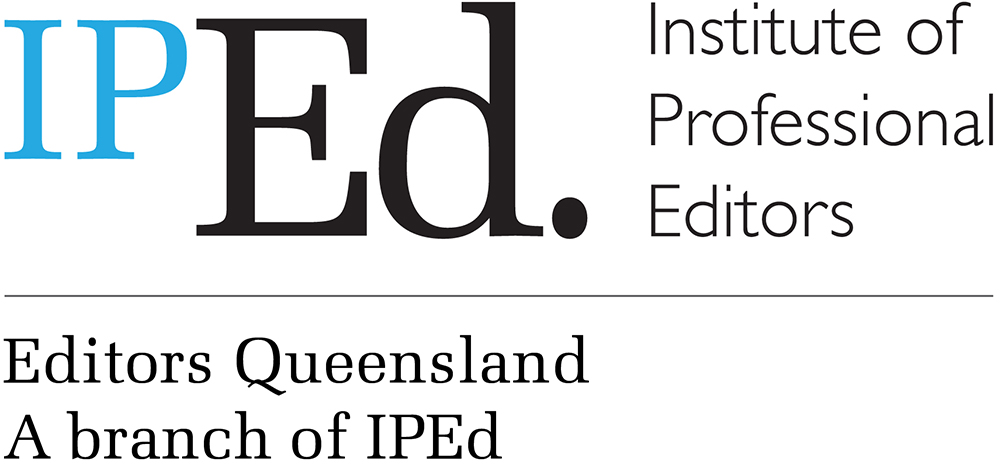
Meetings and social events
EdsQ hosts a range of events. These include:
- monthly meetings with presenters, providing opportunities for professional development and networking. The meetings are held on the first Wednesday of the month in the hall of the New Farm Library (accessible) in Brisbane. Some meetings are held online.
- freelancers lunches, ‘Drinks after five’, an end-of-year dinner and a start-of-year picnic.
For upcoming events, click here.
Professional development
Each year EdsQ hosts a number of professional development workshops, both half-day and full-day. For upcoming workshops, click here.
OffPress archives
IPEd members have access to the archives of OffPress, the former newsletter of EdsQ. The newsletters contain a wealth of information about various aspects of editing.
More about Editors Queensland
News from EdsQ
The IPEd newsletter, Gatherings, contains more news about EdsQ.
Regional subgroups
At present EdsQ has one regional subgroup on the Sunshine Coast. Contact the coordinator of this group to find out about their events.
Affiliates
EdsQ is affiliated with the Queensland Writers Centre and the Australian Institute of Translators and Interpreters Inc.(AUSIT) in Queensland. This means we advertise each other’s events, and EdsQ offers discounted member rates for its events and training to members of its affiliates.
Management committee
EdsQ is coordinated by a committee of volunteers who meet monthly. Please contact our president if you are interested in volunteering with EdsQ.
Follow us on Facebook and Twitter.
Joining EdsQ
When you join IPEd as a professional, associate, student or corporate member of IPEd, you are asked to nominate a branch, so you can choose EdsQ.
Find an editor
Looking for an editor? Search the IPEd Editors Directory. Use the filter if you are looking for an editor in Queensland.
Executive
President: Glenine Hamlyn
Vice-President: Christine Atkinson
Budget Officer: Kerry Davies AE
Secretary: Paul Vanderloos
Executive Member: Janet Hou
Other committee positions
Events: Linden George; Kayt Duncan
Communication Officer: Julia Sudull
Accreditation Board Delegate: Charlotte Cottier AE
IPEd Director: Ruth Davies AE
Affiliates Liason: Glenine Hamlyn AE
Regional Coordinator (Sunshine Coast and Hinterland): Lisa Hill
Regional Coordinator (Gold Coast): Cheryl Malone
Regional Coordinator (Mackay): Paul Vanderloos
Regional Coordinator (Harvey Bay): Deborah Cook
Regional Coordinator (Toowoomba): Tonia Grundy
In October 1990 an enthusiastic gathering of 86 people at the Transcontinental Hotel in Roma Street showed that a Society of Editors was needed to meet the professional requirements of editors, writers, designers, typesetters, printers, and others involved in publishing in Queensland.
In November the first newsletter, Editio Princeps, edited by Dolores Moore, was published, and so the Society of Editors (Queensland) began, thanks to the untiring efforts of Jan Whelan, Mary-Jane Bosch ( inaugural President and Vice-President respectively) and others.
In 1991 the newsletter was renamed Offpress. In that year we also adopted our first logo and held our first training workshop.
![]()



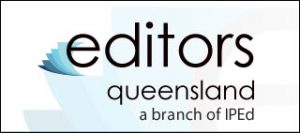
Versions of the Editors Queensland branch logos through the years.
By 1994 we had 145 members. SocEd, as it became known informally, organised picnics, barbeques, and wine bottlings under the Offpressings label, as well as the serious business of training and representation.
In 1998 the Society incorporated, holding its first official meeting in May with Mary-Jane Bosch as President. The Society put up its very first website in 2000, and Mary-Jane Bosch and Jan Whelan were awarded life membership at the Society’s tenth anniversary dinner, a rather grand affair at Customs House.
From 2004 the Society increased efforts to promote the organisation and the profession, giving presentations at the Brisbane Writers Festival (BWF) and building closer ties with the Queensland Writers Centre (QWC). The monumental work of setting up the national accreditation program also began in earnest. The Council of Australian Societies of Editors (CASE) became known as the Institute of Professional Editors Limited (IPEd), and Queensland’s Robin Bennett set up and chaired the first IPEd Accreditation Board.
We nominated seven members as Distinguished Editors in 2006 to form part of a national team, chosen by their respective Societies to conduct the accreditation exams until a pool of Accredited Editors should be available.
In 2008 the Society received funding from the Copyright Agency Limited (CAL) to run a groundbreaking editor mentoring project, another of Robin Bennett’s achievements. The program sourced manuscripts from the QWC and ran for two years.
In 2013 another collaboration between the Society of Editors (Qld) and QWC took place, with editors of fiction being paired with writers for a specific project.
Up to 30 June 2016, the Society of Editors (Qld) was a member of the Institute of Professional Editors Limited (IPEd), and individual editors were members of SocEd (Qld). On 1 July 2016, after a long phase of consultation between the state societies of editors and IPEd, the membership model changed. Individual editors are now direct members of IPEd. This means IPEd can represent them more effectively at the national level, as well as providing coordination in a number of areas.
With the change to direct membership on 1 July 2016, the Queensland editors’ organisation, now a branch of IPEd, changed its name to Editors Queensland.
Today Editors Queensland (EdsQ) continues its mission to meet the needs of its members and the publishing industry. Regular meetings are held monthly – these are open to all. At each meeting a speaker provides informative and often entertaining insights into one of a wide range of informative topics, ranging from writing and editing a specific genre of fiction to copyright issues and the ins and outs of e-publishing.
A broad spectrum of professional development opportunities is also made available to members of EdsQ each year.
The former Society’s papers are archived in the Fryer Library, University of Queensland.
Regional sub-group
In 2013 a regional sub-group of the Society of Editors (Qld) was formed on the Sunshine Coast. This group, now a sub-group of Editors Queensland, holds meetings locally with guest speakers – contact the Sunshine Coast sub-group coordinator, Lisa Hill.
Honorary Life Members
The following members of the former Society of Editors (Qld) were honoured with life membership at various
stages of the organisation’s journey because of their commitment to SocEd (Qld) and their contribution to its
development. Their life membership continues under the organisation’s new name of Editors Queensland and
new status as a branch of IPEd.
Robin Bennett AE
Awarded 2009
Robin Bennett convened the first national editors conference in 2003 and served the Society as acting and
elected president from February 2005 to September 2009. She has also served as the CASE delegate and
subsequently as IPEd councillor for Queensland from 2004 to 2013 and as the Queensland delegate to the
IPEd Accreditation Board from 2005 to 2013. Robin was the inaugural chair of the Accreditation Board. She
became an IPEd accredited editor in 2008. Robin stills serves on the executive of the management committee.
Kerry Davies AE
Awarded 2013
Kerry Davies AE became president of the Society in September 2010, narrowly saving it from an untimely
demise due to volunteer burnout. She was facilitator of the review of IPEd’s Australian Standards for Editing
Practice, 2011-12, producing the second edition, which was launched at the Sixth National IPEd Editors
Conference in Fremantle, 2013. Kerry stepped down from the presidency in August 2013 to become vice-
president and IPEd councillor. She gained her IPEd accreditation in 2011.
Barbara Ker Wilson
Awarded 2002
Barbara was elected president of the Society in August 2000 and was the speaker at the first Society meeting
in November 1990.
Barbara Ker Wilson died in September 2020 at the age of 90.
Jan Whelan DE
Awarded 2000
Jan was the Society’s inaugural president from 1990 to 1992 and gave an extraordinary amount of time and
energy to the Society. Jan’s roles have included interim training officer, MEAA liaison officer, co-editor of the monthly newsletter Offpress, editor of the Register of freelance publishing services, liaison officer and vice-
president. Jan was awarded DE status in 2006.
Mary-Jane Bosch
Awarded 2000
From her first involvement as inaugural vice-president in 1990, Mary-Jane gave freely of her time in many
ways: delivering seminars for the Society, travelling north at her own expense, holding various positions
including president from 1998 to 1999. Sadly, Mary-Jane died in June 2002.
John Collins
Awarded 1993
John Collins, managing director of Jacaranda Press, provided sterling assistance to the fledgling Society with
monetary and in-kind help until 1993, as well as moral support for the Society in its formative years.
John Collins died in April 2017.
Laurie Muller
Awarded 1993
Laurie Muller, managing director of UQ Press, provided sterling assistance to the Society in its early years with
funding and other help.
Roland (Roly) Sussex
Awarded 2016
Professor Emeritus Roly (Roland) Sussex OAM was made an Honorary Life Member of IPEd in July 2016. He
has been Patron of IPEd since 2012, and in 2013 Editors Queensland (then the Society of Editors,
Queensland) welcomed him as an honorary member. Roly Sussex is Emeritus Professor of Applied Language
Studies at the School of Languages and Comparative Cultural Studies of the University of Queensland,
Brisbane. He is also Research Fellow at the university’s Institute for Teaching and Learning Innovation, where
his research focuses on language, culture and technology.
Roly taught linguistics at the University of Reading (UK) and Monash University, was a professor of Russian
language at the University of Melbourne and, from 1989 until 2010, professor of applied language studies at
the University of Queensland. He was chair of the Library Board of Queensland from 2009 until 2014, and has
been president of the Brisbane chapter of Alliance Française since 2010.
Known for his enthusiasm for linguistics as well as for his commitment to the study of second languages – as
well as his enthusiasm for editors and editing – Roly has been talking about language on ABC local radio
since 1997. His show, A Word in Your Ear, is available via Podcast. He also writes a weekly language column
for Brisbane’s Courier-Mail weekend magazine.
Roly received a Medal of the Order of Australia in 2012 for his services to the development and understanding
of languages in Australia. He has been IPEd’s Patron since 2012, when he wrote the foreward for Australian
Standards for Editing Practice, 2nd edition.
EdsQ in Gatherings

Editors South Australia
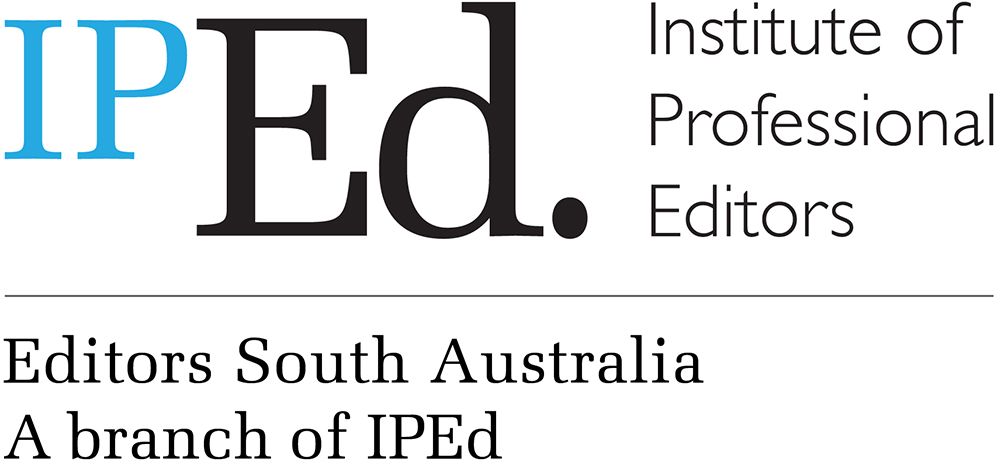
We host regular meetings and workshops for networking and professional development. Non-members are welcome to come along. With the Covid-19 situation we’re not running any meetings in person, but still have online activities planned.
For a list of all IPEd branch events, please click here.
Follow us on Twitter (@EditorsSA) or Facebook for updates about what we’re up to.
President
Sumudu Narayana
Vice-President
Jo Vabolis
Membership Officer
Melanie Dankel
Communication and Marketing Coordinators
Vacant
Secretary
Jo Vabolis
Events
Kerrie Le Lievre
General
Vacant
Budget Officer
Ex-officio
Director
Melanie Dankel
Accreditation Board representative (SA)
Amanda Webster
Mentorship
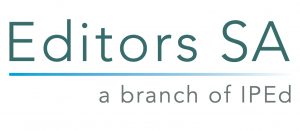
The former SA branch logo.
EdSA is developing information on its history.
EdSA in Gatherings

Editors Tasmania
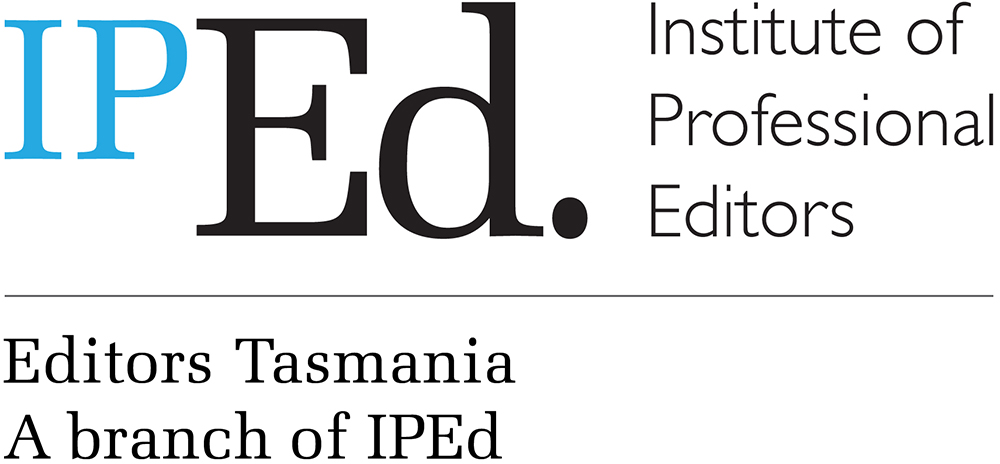
We offer a range of benefits to our members:
Meetings
The committee organises a range of events to provide opportunities for networking and professional development. These include evening meetings, full-day workshops and social functions such as the annual dinner.
If you’d like to come to our next meeting, please book through the events page or email the branch secretary.
Discounts
The following local businesses offer discounts to members of Editors Tasmania:
Hobart Bookshop
The Hobart Bookshop specialises in Tasmaniana, literature and poetry but also has a huge selection of titles in all genres. They sell new and second-hand books. They have been providing a 10 per cent discount to Tasmanian members for more than 15 years. Browse through their collection at 22 Salamanca Square, Hobart; email them; or phone on (03) 6223 1803.
The Quill Consultancy
The Quill Consultancy specialises in computer training courses, application development, preparation of technical documentation and the provision of consultancy and help-desk services. Quill is a Microsoft Certified Partner and stocks the Microsoft Press range of computer publications. They offer members a 10 per cent discount on their training courses (except those already discounted). To book for a training course, seek more information, or be included on their mailing list please email them or phone (03) 6231 0577.
Social media
We have a Facebook page and Twitter account.
Membership eligibility
To join Editors Tasmania, you need to become a member of IPEd.
Our executive committee meets monthly. Current members are:
President: Sabine Borgis
Secretary: Alex Sutherland
Budget officer: vacant
Mentorship Coordinator: Vacant
IPEd Board Director: Gordon Campbell
Accreditation Board representative: Linda Nix
Tasmanian members of the IPEd Board and Accreditation Board are ex-officio members of the committee.
If you wish to contribute to the work of the committee, email the branch secretary
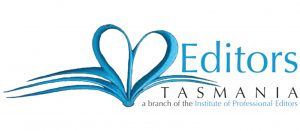
The former Tas branch logo.
EdTas is developing information on its history.
EdTas in Gatherings

Editors Victoria
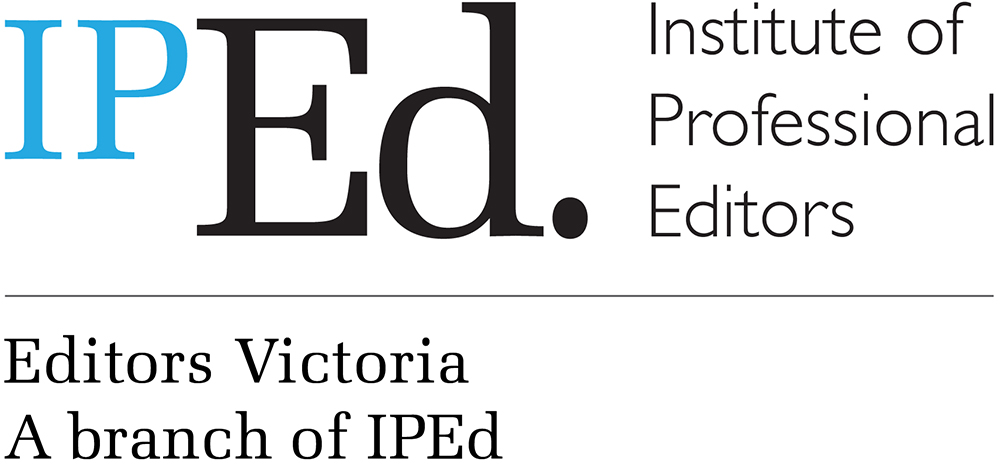
Editors Victoria is the Victorian branch of IPEd.
We offer a range of benefits to our full and associate members:
Speaker meetings
We host regular branch meetings featuring guest speakers on a variety of topics from across the editing and publishing industries. Our speaker meetings are generally held on Zoom, but in-person meetings are held from time to time.
Non-members are welcome. Members of Editors Victoria and affiliate organisations receive discounts on the general admission price.
See details of current events and book on the IPEd events page (filter for events held by the Victorian branch).
Other branch meetings
Each year we hold an Annual Branch Meeting (including entertainment) and an end-of-year party. These are great opportunities to gather with other members, network and celebrate the work of the branch and our editing community.
Networking events
Lunches are held throughout the year and offer a fantastic opportunity for members to meet and network with colleagues. Networking lunches in Melbourne are held roughly every three months, often at The Fitz Cafe in Fitzroy. Occasional evening gatherings are also offered.
As well as Melbourne events, regional gatherings are organised if there is sufficient interest and a local host. (If you are a regional editor wishing to meet other members in your area, contact edvic.president@iped-editors.org.)
Search for current networking events on the IPEd events page filter for events held by the Victorian branch).
Networking online
One-hour online discussions (‘Zoom cuppas’) are offered regularly. These free (unrecorded) discussions are usually thematic, with appropriate hosts. They’re a great chance to chat with other members and share tips.
Professional development workshops
Editors Victoria offers training courses in editing skills, technical skills, business skills and genre editing. Topics are developed to broadly align with the Australian standards for editing practice. Workshops range from a couple of hours to a full day, and may be held online (via Zoom) or in-person at the CAE in central Melbourne. These are supplemented by webinars run by IPEd. We also offer courses to prepare members for the IPEd accreditation exam in relevant years.
Some of our courses are open to non-members. Members of Editors Victoria and affiliate organisations receive discounts on the general admission price.
See details of current workshops and book on the IPEd events page (filter for events held by the Victorian branch).
Mentoring
The IPEd Mentoring Program offers members the opportunity to improve their editing skills with professional oversight and feedback from experienced editors. It provides a two-way learning experience for both mentor and mentee, which can have numerous benefits in many career, organisational and developmental areas. See details at IPEd Mentoring or email edvic.mentorship@iped-editors.org.
Social media
Members can learn about our activities and access topical discussion and information on our social media pages:
facebook.com/EditorsVic
twitter.com/EditorsVic
linkedin.com/groups/3434795
Resources
As well as receiving the current IPEd newsletter, Gatherings, members have access to the archives of the former newsletter of Editors Victoria, containing many articles on editing practice, reports on past events and editing resources and tips.
Membership
If you are interested in joining Editors Victoria as a professional, associate, student or corporate member, please read more on the IPEd Become a Member page.
Committee
The Editors Victoria committee meets monthly. You can see a list of our current committee members by clicking the ‘Committee’ tab above.
The committee includes an Executive (elected at our Annual Branch Meeting) as well as subcommittee members and advisers. Subcommittees support work in specific areas, such as Communications, Events and Professional Development. We are always looking for new committee members to bring fresh ideas and energy to the mix. If you are interested in joining a subcommittee, please let us know (edvic.president@iped-editors.org). You don’t need to have been a member for decades, but you do need to have been around long enough to like us, have some idea of how we tick and want to be more closely involved.
Affiliates
Our affiliate organisations are Writers Victoria, Australian Society for Technical Communication (ASTC), Australian and New Zealand Society of Indexers (ANZSI) and Australian Publishers Association (APA). Members of affiliate organisations receive discounted admission to our events.
Find an editor
Looking for an editor? Search the IPEd Editors Directory. Use the filter if you are looking for an editor in Victoria.
Editors Victoria COVIDSafe plan – as of 28 June 2021
Learn about Editors Victoria’s COVIDSafe plan for in-person activities.

Editors Victoria was founded in October 1970, as the Society of Editors. The inaugural members included Ruth Dixon, Hedley Finger, Di Goodall, Jan Llewellyn, Janet Mackenzie, Bob Sessions and Wendy Sutherland. The first annual general meeting was held in June 1971, and Editors Victoria was incorporated in 1991 under the name Society of Editors (Victoria).
When Editors Victoria was formed, publishers were beginning to withdraw from in-house training for editors. Over the years, Editors Victoria has worked hard to fill this gap, organising hundreds of courses and workshops on a wide range of topics, from the basics of editing to copyright law and ergonomics. Working closely with RMIT, Editors Victoria helped establish the Graduate Diploma in Editing and Publishing, which began in 1988. Victoria developed the Redact residential weekends to offer intensive advanced training for editors. Five weekends were run between 2006 and 2015 at Mansfield, Geelong and Daylesford.
Editors Victoria has published a number of books: One of the First and One of the Finest (a biography of Beatrice Davis), 1991; At the Typeface, 2005; and Editors in Conversation 1, 2007; and Editors in Conversation 2, 2009.
Editors Victoria has also provided strong support for freelance editors, producing the Freelance Register since the late 1970s, now superseded by the IPEd Editors Directory.
In 1998, Editors Victoria was active in the establishment of the Council of Australian Societies of Editors (CASE), which was the first national body to represent editors. CASE was succeeded in 2008 by the Institute of Professional Editors Limited (IPEd), and in 2016 IPEd became a national, direct membership association. As individual editors are now direct members of IPEd, IPEd can represent them at the national level, as well as provide coordination in a number of areas. Editors Victoria is now a branch of IPEd, run by its own committee elected by its branch members according to the constitution of IPEd..
Editors Victoria has hosted two of IPEd’s editing conferences, ‘Editing in Context’ in 2005 and ‘Beyond the Page’ in 2019.
In 2010, Editors Victoria celebrated its 40th birthday at the Wheeler Centre in Melbourne. To mark the occasion, Editors Victoria created a Commemorative Booklet [PDF 289KB].
The 50th anniversary celebrations in 2020 were held online via Zoom due to COVID-19. Preparations for the event uncovered a collection of memorabilia from early newsletters and events.
Honorary life members
Editors Victoria’s honorary life memberships recognise individuals who have provided outstanding service to the association and to the editing profession in Australia over an extended period.
Since 1987, Editors Victoria has awarded 25 honorary life memberships.
John Bangsund (awarded 1987)
John Bangsund (b.1939) Born and schooled in Northcote, Victoria. Worked 1954-71 as clerk, bookseller’s assistant (Cheshire), librarian (Victorian Railways Institute), publisher’s representative (Cassell), printer’s reader (Wilke), journalist (Age Publications) etc.; 1972-78 as subeditor (journalist, A grade), Parliamentary Reporting Staff, Canberra; editor (clerk, class 6), Australian Government Publishing Service; senior editor, Rigby Ltd, Adelaide. Freelance editor/proofreader, 1976-2005. Assistant editor (from 1994 editorial consultant), Meanjin, 1988-2005. Publisher, Australian Science Fiction Review and other publications, variously titled, 1966-2005. Editor, Society of Editors Newsletter, more often than not, 1978-96; in that time also served on the committee in every capacity except treasurer, even standing in as acting president on one occasion. FAW Barbara Ramsden Award, 1984. A. Bertram Chandler Award, 2001.
John Curtain (awarded 1996, d. 1999)
Beatrice Davis (awarded 1987, d. 1992)
Beatrice Deloitte Davis was born on 28 January 1909 in Bendigo, Victoria. Beatrice was still studying the piano at the Conservatorium of Music in Sydney when she began her university studies at the University of Sydney. She graduated with a BA in 1929 and began her working life as a stenographer at the French Trade Commission. She then worked for the Medical Journal for seven years, first as a stenographer and then as an editorial assistant. Beatrice freelanced for Angus & Robertson for a few years, and in 1937 began working in-house. She stayed with Angus & Robertson for 36 years, until 1973, and was the company’s first full-time general editor. She created the editorial department, choosing and training a succession of fine editors, among them Nan McDonald, Rosemary Dobson and Alec Bolton. Beatrice also dealt with many published writers, either as their editor or as the head of the editorial department, including Thea Astley, Marjorie Barnard, Manning Clark, Alexandra Hasluck, Ruth Park, Hal Porter, Kylie Tennant, Judah Waten and Judith Wright.
From 1974, Beatrice worked for Thomas Nelson (Australia) Ltd, and a few of her Angus & Robertson authors followed her to Nelson. In 1986, at the age of 77, Beatrice continued to freelance, mostly for Mead & Beckett.
In 1981 Beatrice was made a Member of the Order of Australia for her service to literature. She had served as a judge of the Miles Franklin Award from its inception in 1957. Beatrice was nominated for honorary life membership of Editors Victoria in 1987.
Beatrice died in 1992, aged 83, and the Beatrice Davis Editorial Fellowship was established in her memory.
Ruth Dixon (awarded 1987)
Ruth Dixon was born into a family of bookworms. On leaving school, she worked in the Melbourne University Publishing bookshop, then as assistant to the printing manager at Ruskin Press, secretary to the publishing manager, and finally as editor, while studying for a BA at the University of Melbourne (1958-61). She travelled by ship to London and worked in the production departments at Longmans Green (1962-64) and Faber & Faber (1964), completing a one-year Publishers’ Association Book Production course. Her unforgettable journey home was overland, by bus.
Back in Melbourne, Frank Eyre offered Ruth a position as editor at Oxford University Press (1965-68), alongside Wendy Sutherland. In 1969 came experience in paperback publishing, with Brian Stonier and Lee White at Sun Books. For the next four years Ruth worked at Cheshire with Trevor Barr, John Curtain and Barney Rivers, and became the senior editor, responsible for editorial standards, training and workflow. During this period the fledgling Editors Victoria came into being, due to an opportune encounter between Ruth and Janet Mackenzie. Ruth’s chosen role in the new association was training officer, providing opportunities for improving editing standards. Her final editorial positions (1973-74) were at ASEP, the national science project, and ACER, before wanderlust got the better of her.
After travelling to North and South America and the UK, Ruth found employment as acquisitions librarian at Hawthorn State College, while studying part time (Grad Dip Lib., RMIT, 1976-77). After an interlude in Germany, Ruth became acquisitions librarian at Chisholm Institute, was seconded to the new Western Institute (1987-88) as its first technical services librarian, and in 1990 was appointed systems support librarian at Monash University, Caulfield. Ruth’s lifelong interest in training people in complicated and skilled tasks was given plenty of scope. In 1992 Ruth completed a Graduate Diploma in Applied Science at Deakin University. She retired in 1996 to pursue her interests in computer-assisted tasks and editing video.
Frank Eyre (awarded 1987, d. 1988)
Elizabeth Flann (awarded 2004)
Anne Godden (awarded 1989, d. 2004)
Beryl Hill (awarded 1989)
Beryl Hill was born in Melbourne in 1937. She began her formal editorial career at Melbourne University Press as a trainee editor under the watchful eye of that doyenne of editors, Barbara Ramsden. Over the following 40 years, Beryl worked as a freelance editor/consultant, as well as an in-house editor, often both simultaneously.
Beryl has held senior editorial and project management positions with publishers and academic institutions such as Oxford University Press, Penguin Books, Victoria College, Computer Documentation, Lothian Books and Deakin University, returning to Melbourne University Press in 2002. Her freelance and in-house projects were always varied – from prestigious art history publications and exhibition catalogues for the National Gallery of Victoria, to books about mud bricks, desert travel, crafts, Australian history, gardening, botany, cookery, humour, health and natural therapies, medicine, sport and politics, to dictionaries, educational textbooks and ancillary materials, to academic studies in such areas as education, environmental and world issues, history and biography, projects for government departments, technical manuals for business organisations, to TV scripts, even magazines on rock climbing and bushwalking.
Beryl has been a guest lecturer at RMIT and Monash University, and for several years was a training officer with Editors Victoria, running a series of editing workshops. These eventually led to the publication, with her co-trainer/author Elizabeth Flann, of The Australian Editing Handbook in 1994. The book received an award for excellence in educational publishing and became a recommended textbook for all graduate diplomas, TAFE and other courses in publishing and editing. In 2004, the book was updated and expanded to a second edition to reflect the changes and challenges facing editors today.
Beryl has been an honorary life member of Editors Victoria since 1989 and is currently one of the accreditation assessors for the Institute of Professional Editors (IPEd).
Nick Hudson (awarded 1995)
Nick Hudson arrived in Australia from the UK in 1958, with the brief to set up an Australian arm of Heinemann Educational Books.
The 1960s were all about science books for Nick. Early successes included A Modern Approach to Chemistry (1963) by Jack Stove and Keith Phillips, probably the first Australian chemistry text to sell six figure quantities overseas. In Search of Science (1965) was hailed by Max Harris in the Australian Book Review as “an all-Australian spectacular”.
His major project during the 1970s was the Heinemann Australian Dictionary, the first Australian general dictionary that did not start as an adaptation of an overseas original. As a result, overseas rights were sold, with the book appearing in adaptations for the UK, the US, Canada and New Zealand. It was also probably the first dictionary in the world to be created with an integrated editorial and production computer program.
In the 1980s, Nick concentrated on trade books, after Heinemann Educational Australia took trade company WHA to form Heinemann Publishers Australia. Project highlights were Steve Murray-Smith’s The Dictionary of Australian Quotations (1984) and Peter Wright’s Spycatcher (1987).
After leaving Heinemann in 1985, Nick started his own company, Hudson Publishing Services, which provides editorial and production services for third parties and publishes in its own right. Publishing successes include eleven titles by Kate Llewellyn, including The Waterlily (1987), and six titles by Robin Levett, including The Girls (1997), both bestsellers. The services side of the business specialises in maths books, with customers including Coghill Publishing and Phoenix Educational.
Nick Hudson is the author of Modern Australian Usage (OUP, 1993) and a number of other books, articles, academic papers and broadcast talks. He is a life member of both Editors Victoria and the Australian Publishers Association, the latter awarded in recognition of Nick’s work on copyright.
Colin Jevons (awarded 1995)
Colin Jevons graduated from Monash and Swinburne universities, and the University of Melbourne. His career in editing began as a graduate trainee at Macmillan in 1979. He became the sales manager for the southern states before moving to Edward Arnold in an editorial capacity in 1980. From Edward Arnold he went to Nelson in 1983, where he rose to the position of publisher, before the traditional restructure saw him becoming a consultant in 1990.
In the meantime, Colin had been part of the group that developed what is now the Centre for Publishing Studies at RMIT, serving as chair of the course development and advisory committees. A stint at Collins Booksellers was followed by a job as marketing manager at Oxford University Press. In 1992 Colin left the book industry to become a business academic.
At various times throughout his career, Colin served as secretary, treasurer and president of Editors Victoria.
Susan Keogh (awarded 2000)
Vane Lindesay (awarded 1989)
Janet Mackenzie (awarded 1996)
Sally Milner (awarded 1989)
Stephen Murray-Smith (awarded 1987, d. 1988)
Rosemary Noble (awarded 2012)
Renée Otmar (awarded 2000)
Renée Otmar was born and raised in Cape Town, South Africa. In 1986, she came to Australia as a young immigrant, with no money or familial support and few skills. What she did have was a strong work ethic, a thirst for learning and an enormous appetite for fun and adventure.
In 1989, Renée started editing manuscripts for publication while working as an administrative assistant in the Key Centre for Gerontology Research and Education at the Abbotsford Convent campus of La Trobe University. Her editing career began in earnest when the printing and publications unit poached her to become its in-house editor at the main La Trobe University campus, Bundoora. Since then, Renée has amassed considerable in-house and freelance experience in editing and publishing. In 2005, she took her first step towards independent publishing, with a novel by the Western Australian writer John Cregan.
Renée is also a published author, having written a true crime memoir (In Cold Blood: The Murder of Baby Jordan, New Africa Books, 2007), and a scientific paper for a refereed journal (“Patterns of Treatment in Australian Men Following Fracture”, Osteoporosis International, 2010), along with hundreds of fact sheets, brochures, booklets, guides and website content on prevention of harm due to alcohol and other drugs (Australian Drug Foundation, 2002-08).
On her own and in partnership with editor Sally Woollett, Renée has designed and presented countless workshops and seminars training editors in basic business and marketing skills. A confident public speaker, she has delivered presentations at conferences, seminars, workshops and other professional development courses.
Currently, Renée juggles freelance writing and editing with PhD research investigating barriers to osteoporosis treatment.
Renée holds a BA in Politics and Media Studies from Swinburne University, a Graduate Diploma in Editing and Publishing and an MA in Communication from RMIT University, and a Master of Public Health from the University of Melbourne.
Renée joined Editors Victoria in 1992 and served on its committee for fourteen consecutive years, including three terms as president. She was a founding member of the Council of Australian Societies of Editors (CASE) in 1998, and took an active role in its progression towards a national organisation for editors in 2005 as the Institute of Professional Editors (IPEd). Renée was a foundation member of the Occasional Series on Australian Editors Working Group (2004-06).
Renée Otmar was granted honorary life membership of Editors Victoria in 2000 and the honorary award of Distinguished Editor by IPEd in 2008.
Teresa Pitt (awarded 1987)
Teresa Pitt graduated with a BA in English Literature and Politics from the University of Melbourne in 1974. She began her editorial and publishing career as a trainee editor at Greenhouse Publications in 1980. Over a 26-year career she held various positions as editor, senior editor, publisher and commissioning editor, with organisations including the Institute of Family Studies, Pitman Publishing, Currey O’Neil Ross, Lloyd O’Neil, Penguin Books Australia (twice), William Heinemann Australia, the Macmillan Company of Australia, Melbourne University Press, Simon & Schuster (Australia) and Lothian Books.
Teresa taught editing in the Associate Diploma of Arts Professional Writing and Editing course at RMIT TAFE for five years, from 1992 to 1996, while also guest lecturing in the RMIT Graduate Diploma in Editing and Publishing. She was speaker secretary for Editors Victoria in 1982-83 and president from 1983-85.
From 1985 to 1989, Teresa was a member of Editors Victoria’s Working Party on Training and Accreditation, the group which developed and established the Graduate Diploma in Editing and Publishing at RMIT. From 1989 to 1992 she was a member of the Course Advisory Committee.
Yvonne Rousseau
Ruth Siems (awarded 2007)
Liz Steele (awarded 2012)
Wendy Sutherland (awarded 1987)
Wendy Sutherland was born in Melbourne in 1936. Wendy’s early interest in literature and reading was fostered in a household of books, and by an inspiring English teacher at school, who also encouraged her to go on with Latin to what was then called matriculation level. Having graduated with a BA in French and English from the University of Melbourne, Wendy worked in private and municipal libraries before making the obligatory overseas trip. (Wendy had also gained a preliminary certificate in librarianship while finishing her degree.)
On return to Australia, Wendy began her editorial career at Oxford University Press (OUP), Melbourne, as a result of a blind leap of faith on the part of manager Frank Eyre. Her only previous experience of editing had been with the school magazine (which didn’t impress Eyre at all), but the library course helped a lot with definitions of bleeding plates, preliminary pages and so on. No one could have had a better mentor than Frank Eyre.
After nineteen years at OUP, with brief interludes occasioned by the birth of two children (wonderful) and a year in Darwin (challenging), Wendy joined Melbourne University Press in 1978 as editorial manager. Despite the title, most of the work was “hands on”, and she was also responsible for the training of junior editors. Wendy has been a freelancer since 1995, working for both of the above, as well as UWAP, Hyland House, Simon & Schuster, Lothian Books, CUP, Allen & Unwin and Aboriginal Studies Press.
During her time at Melbourne University Publishing, Wendy won the Barbara Ramsden Award three times and in 1994 was the recipient of the university’s Gold Medal.
Wendy’s professional affiliations include membership of the committee responsible for the fourth edition of the Australian government’s Style Manual for Authors, Editors and Printers. She was guest lecturer in Scholarly Editing for RMIT University’s Graduate Diploma in Editing and Publishing, and involved in the Publishing Advisory Committee for the Australian Music Examinations Board. Wendy has also participated in occasional grammar workshops run by Editors Victoria.
Wendy was one of nine founding members of Editors Victoria, and in 1987 she became one of its first honorary life members.
Basil Walby (awarded 1987)
Basil Walby was educated at Latymer Upper School and King’s College, London, where he read chemistry and mathematics before gaining an honours degree and corporate membership of the Royal Institute of Chemistry and the Institute of Mathematics.
He was editor-in-chief to the Commonwealth Scientific and Industrial Research Organisation (CSIRO), 1971-87, and was responsible for developing the CSIRO publications program. Basil managed the Australian Journals of Scientific Research, CSIRO’s book publishing program, and a printing unit set up to produce journals, technical publications, annual reports and publicity material. He also oversaw liaison with comparable science publishers in Australia and overseas to extend the reach of CSIRO material, in-house training and education of CSIRO staff employed in knowledge transfer, librarians and divisional information officers and editors, and the promotion of the above activities.
Since July 1987, Basil Walby Publishing Services has offered a wide range of consultancies. Clients have included the International Bureau for Plant Genetic Resources, the International Crop Research Institute for the Semi-Arid Tropics, the Australian Defence Department, the Australian Artificial Intelligence Institute, ANZAAS and the University of Melbourne.
Basil was a founding member of Editors Victoria and served on the committee for many years, twice as president (in 1974-75 and 1982-83 with Teresa Pitt). He was treasurer from 1976-78, and training officer in 1977-78 (with Anne Godden) and 1982-83 (with Tessa Jones and John Bangsund). Basil was a member of the Style Manual review committee and the inaugural RMIT advisory group for the Graduate Diploma in Editing and Publishing.
Lee White (awarded 1986)
Lee White was born at the bush nursing hospital at Springwood in the Blue Mountains, New South Wales, towards the end of the Second World War, just avoiding being a “baby boomer”. Her family moved to Victoria in the early 1950s.
In 1965, having decided against a career as a professional musician, and after dropping out of the law course at the University of Melbourne, Lee tumbled into editing when she answered an advertisement seeking a secretary for the managing director of Sun Books, a “new Australian publishing company”. The managing director was Brian Stonier and the editorial director was Geoffrey Dutton, who then lived in Kapunda, South Australia. Gradually, Lee started doing basic editorial work and became more involved with the editorial side of publishing. After about two years with the company, she travelled to the UK and received further editorial training at William Collins Ltd and, briefly, with other London book publishers.
Returning to Australia, Lee was appointed editor at Sun Books and worked for the company through its vicissitudes until it became the paperback imprint of the Macmillan Company of Australia. Lee was appointed senior editor at Macmillan and later publisher of Macmillan’s Australian Literature list.
After a decade in the book publishing industry, Lee sought a change. She became the public relations officer for the National Gallery of Victoria, then moved to Monash University as publications officer, and finally commenced freelance editing and journalism. She completed a BA in Journalism at RMIT and went on to complete a Masters degree at Murdoch University. Personal circumstances required a move out of Melbourne, and from 1984 Lee has worked full time as a freelance book editor for many mainstream book publishers in Australia.
Over the years, Lee has worked with a wide range of Australia’s well-known general and academic authors, including Patsy Adam-Smith, Geoffrey Blainey, Roland Robinson, Bryce Courtenay, Stephen Murray-Smith and Pam Peters.
Jackie Yowell (awarded 2006)
Jackie’s publishing career began as an editor with Longman in Kenya, where she was born and raised. After travelling in Europe, she came to Melbourne in 1972 to work with Longman Australia. Her 35-year career spans the spectrum – trade, educational and specialist lists, fiction and non-fiction, adult and children. She worked in publishing houses large and small, including in-house with Cheshire, Lansdowne and Five Mile Press, as well as a freelancer. A decade with Penguin Books Australia in the 1980s was especially memorable, when “a great team published zealously – to map Australia’s culture”, with authors ranging from Thea Astley to Gough Whitlam. Jackie twice received the Barbara Ramsden Award, won jointly with Susan Hawthorne for Jessica Anderson’s Stories from the Warm Zone and with Margit Meinhold for Mark Henshaw’s Out of the Line of Fire.
In 1992 Jackie established Silver Gum Press, publishing a list that included Irena Sibley’s best-selling children’s classic, The Bilby’s First Easter. In 1997 she joined Allen & Unwin as a publisher, merging Silver Gum’s list with Allen & Unwin’s. As a consulting publisher with Allen & Unwin, Jackie has developed adult non-fiction titles with authors like Tim Costello, Anne Deveson and Anna Lanyon.
Alongside her publishing career, Jackie also guest lectured on publishing at RMIT, Monash and Victoria universities, and at TAFE colleges. She also worked on the committees of arts and community organisations, including the Spoleto Festival, Victorian Writers’ Centre, Community Arts Network, Victorian Ministry of the Arts, Brotherhood of St Laurence and Australian Society magazine. Pursuing her interest in other cultures through part-time study at the University of Melbourne, she completed a postgraduate diploma in Anthropology in 2005.
Jackie was among the first members of Editors Victoria, becoming a committee member in May 1971. As newsletter editor in 1972, she printed Editors Victoria’s newsletter on Cheshire’s gestetner machine. During the 1970s, she worked alongside other committee members to improve training, surveying salaries and union support for editors.
Charles Houen (awarded 2014)
Editors Victoria, a branch of IPEd, is run by a dedicated team of volunteers. The committee of Editors Victoria meets monthly. The committee includes an Executive (elected at our Annual Branch Meeting) as well as subcommittee members and advisers. Subcommittees support work in specific areas, such as Communications, Events and Professional Development.
We are always looking for new committee members to bring fresh ideas and energy to the mix. If you are interested in joining a subcommittee, please let us know (edvic.president@iped-editors.org). You don’t need to have been a member for decades, but you do need to have been around long enough to like us, have some idea of how we tick and want to be more closely involved.
2022-2023 Committee
Executive Committee
President — Margaret Trudgeon
Vice President — Vacant
Secretary — Bridget Blair
Budget — Jenn Zabinskas
Communication — Cecile Shanahan
Events — Lee Ellwood
Professional Development — Caroline Arnoul
Projects and Outreach Officer — Ann Philpott
Ex-officio committee members
IPEd Director — Stephanie Holt
Accreditation Board Delegate – Susan Pierotti
Inclusion and Access Advisor — Thirangie Jayatilake
Student Adviser — Steph Huddleston
Subcommittees
Communication — Sophia Chan
Events — Kylie Howard
Professional Development — Donald Ritchie
Staff officers
Administration Officer — Vacant
EdVic in Gatherings

Western Australia
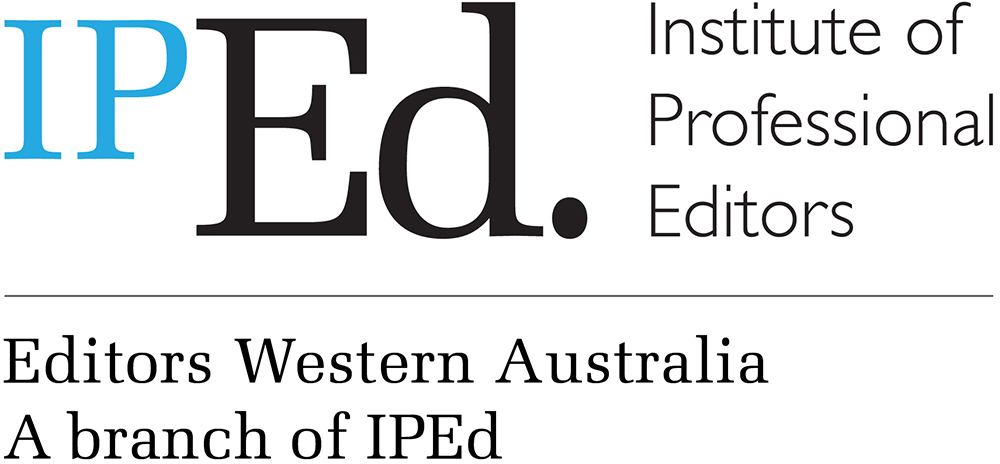
To support our members and provide them with opportunities to network, expand their skills, and engage with our evolving industry, we organise a variety of meetings and professional development events. To attend these events, please register online through your membership login on the IPEd website. First log in, and then use the Book Events button to go to an Events page. Either select an event from the list on the lower part of the page or use the date and event type options to filter and search for an event you would like to attend. For most events, anyone is welcome to attend, using this link.
Networking meetings
Several times a year, we offer members the opportunity for networking and professional development. The majority of a meeting is devoted to a single topic related to editing and may take the form of a training session, guest lecture or group discussion. However, there is always time to share a cup of tea or coffee, or a glass of wine, and chat with the other attendees.
Previous meeting topics include:
- education and training for editors
- editing cookbooks
- tax rights and obligations for freelancers
- editing poetry
- legal editing
- political correctness
- writing, editing, and publishing with Aboriginal people
- children’s publishing and editors
- self-publishing
- preparing for the accreditation examination
- student literacy skills, the English curriculum
- writing and editing for online publications
- exploring the author–editor working relationship
- Microsoft Word tips and tricks
- world English and ‘other’ Englishes
- defamation.
If you wish to present a topic or have an idea for one, please contact the president.
Cafe society
On a less formal basis, our cafe society events are a great way for members, both new and old, to get to know each other and share stories and ideas. Each event is held at a different time and location to suit the broad spread of our membership.
See details of the next meeting here. We look forward to seeing you there.
Other events
Other activities that we host include our Christmas gathering, the annual branch Winter Seminar, and various workshops.
Members may also participate in the events and workshops offered by IPEd branches in other states. For all event details and bookings, go to the IPEd Events page.
Social media
If you’d like to keep up to date with our activities, please follow us on Twitter and Facebook to find out what’s on, or contact our communications officer.
IPEd Mentoring Program
The IPEd Mentoring Program for editors offers the opportunity for members to improve their editing skills with professional oversight and feedback from experienced editors. It provides a two-way learning experience for both mentor and mentee, which can encourage deep satisfaction and numerous benefits in many personal, career, organisational and developmental areas. See the IPEd Mentoring Program page or contact our WA mentoring coordinator for more details.
Membership eligibility
If you are interested in becoming a member of Editors WA as a professional, associate, student or corporate member, please read more on the Become a Member page.
Editors WA Committee
The Editors WA committee is a group of dedicated volunteers elected annually by branch members at the Annual Branch Meeting. Some of the committee roles include President, Secretary, Events Coordinator and representatives on the various national standing committees. General committee members may also be elected at the ABM, and other branch members may volunteer from time to time to help out on subcommittees or with organising events.
The committee meets once every four to six weeks on a Tuesday evening, usually online. If you are interested in volunteering or would like to get in touch with committee members for more information, please go to our Committee contact page.
These are the current office holders of the Editors WA branch committee:
President/SCPD
Jess Gately
Secretary
Josephine Smith
Budget/CSC
Angela Rogerson
Presentations
Brooke Burke
Events Officer
Liam Selby
Ex-officio
IPEd Director
Catherine Macdonald
IPEd Accreditation Board representative
Catherine Macdonald

The idea was sparked by Robin Appleton, then visiting editor-in-residence at a WA university – Western Australia needs a society of editors! The call was eagerly taken up by a small group of like-minded people, and in 1992 the Society of Editors (WA) was born.
Five people made up the inaugural committee of the Society of Editors (WA) (SoEWA) in January 1993 and set the course for the future. They were Edwina Davies Ward (Chairperson), Glynis Traill-Nash (Secretary), Ray Forma (Treasurer and Membership Secretary), and Nicola Rycroft and Terry Richards (Newsletter and Information). The first general meeting of the society was held in April 1993, and the inaugural issue of our newsletter, Book Worm – as Bookworm was styled back then – appeared in May. Tellingly, it featured an article that argued persuasively for a national body of editors, glimpsing a future that lay ahead.
In those early days, regular meetings were held in the rooms of the Secondary School Science Teachers Association in Osborne park. Among the members who joined in that first year were Christine Nagel, Amanda Nolan, Helen Bradbury, Greg Brotherson, Kaye Caporn, Betty Durston, Amanda Curtin, Susan Green, Irene Ham-Sauman, James Hansen, Kate Hooper, Nicholai Knuppe, Suzanna Norton, Leo van den Plas, Elizabeth Tuettemann, Allan Watson, Richard Hartzell, Rosanne Dingli, John Smith, Alex Forbes, Beth Leslie, Dennis Haskell and Rob Finlayson. By the end of 1993, SoEWA ranks had already swelled to 40, and these founder members all worked towards shaping the early years of the society.
Our organisation grew and thrived through the years, promoting the interests and professional development of editors in our state and beyond. In 1997, SoEWA was the first body of editors in Australia to establish its own website. Bryce Moore, who had also set up the group’s email service the year before, was responsible for its development. In 1998, Alex George was instrumental in arranging a meeting in Melbourne to form the Council of Australian Societies of Editors (CASE), which resulted in the landmark, groundbreaking publication The Australian Standards for Editing Practice. The formation of CASE helped move us one step closer to the vision of a national body that had been espoused in our very first issue of Bookworm in 1993. The year 2000 came and saw the incorporation of the SoEWA. In March 2002, Betty Durston had the honour of being appointed the society’s first-ever Honorary Life Member, and in August that same year, the society celebrated its 10th anniversary.
In 2008, the dream held aloft in the first issue of Bookworm came to fruition: CASE was transformed into the Institute of Professional Editors, thus making the aspired-for national body a reality. Yet, it didn’t stop there. On 1 July 2016, SoEWA members took the majority decision to transition to direct membership of IPEd as a restructured national organisation, and we became Editors WA, Western Australian branch of IPEd, as we are known today. The new IPEd is governed by an updated constitution and guided by policy documents, while Editors WA itself is run by its own committee elected by its state members according to the constitution of IPEd.
Our journey thus far has seen the spark that was ignited in 1992 become far more than we could have foreseen at the time. Today, in 2021, we boast around 100 WA members, including professional, associate and student members, as well as a renewed boost of activities and drive. Editors WA carries on in the spirit of SoEWA, advancing our mission to represent, support and provide development opportunities for editors, proofreaders and others in the publishing and communications industries. The spark has taken us from being a small local society here in Western Australia to being part of an organisation that now spans all of Australia and New Zealand, and our love of all things language continues to inspire us for the future.
Acknowledgements: Many thanks to members and affiliates who provided the material from which this information is sourced: Rob Finlayson, Anne Surma, Robin Appleton and Glynis Traill-Nash, speeches given at the 10th anniversary celebrations of the Society of Editors (WA) in December 2002, reproduced in the February 2003 issue of Bookworm; James Hanson, Anne Surma and Amanda Curtin, speeches held at the 21st anniversary of SoEWA in 2013, provided by the authors themselves. Catherine Schwerin, 2021.
Bookworm archives
The former Society of Editors WA regularly published the newsletter Bookworm and continued this in its early days as Editors WA, a branch of IPEd. This newsletter has since been replaced by Gatherings, which is jointly produced by all IPEd branches. You can still view the content of Bookworm archived here.
EdWA in Gatherings
Honorary life members
Honorary Life Members are members who have made a significant contribution to their branch, to IPEd or the editing profession, nominated by two voting members and endorsed by 75% of members present at any branch general meeting and endorsed by the IPEd Board, or nominated by the IPEd Board and endorsed by that member’s branch.
* HLMs marked with an asterisk have passed away.
This list is compiled from IPEd archival material and includes only HLMs who have given permission for their names and the year that they were awarded HLM status to be included on the website. If you have information about any missing HLMs, or are an HLM who has not yet given permission for your name to appear on the website but would like to do so, please email projects@iped-editors.org so the list can be updated.
A
Allison, Sheila (EdTas, 2008)
Appleton, Robin (EdNSW, 2009)
B
Ball, Pamela (EdSA, 2018)
Bangsund,* John (EdVic)
Bennett, Robin (EdsQ, 2009)
Briggs, Edwin (Ted) AE (EdNSW, 2013)
D
Davies, Kerry AE (EdsQ, 2013)
Disney, Karen DE (EdSA, 2008)
F
Flann, Elizabeth (EdVic, 2004)
H
Hansen, James (EdWA, 2007)
Hill, Beryl (EdVic, 1989)
Houen, Charles (EdVic, 2014)
Howarth, Bruce (EdNSW, 2013)
J
Jellett, Celia DE (EdSA, 2013)
Jevons, Colin (EdVic, 1995)
Judge, Peter (EdNSW, 1999)
L
Luke, Rosemary (EdSA, 2015)
M
Muller, Laurie (EdsQ, 1993)
N
Noble, Rosemary (EdVic, 2012)
O
Otmar, Renée PhD, DE (EdVic, 2000)
P
Peters, Pam DE (EdNSW, 2018)
Pitt, Teresa (EdVic, 1987)
R
Rintoul, Susan DE (EdSA, 2011)
S
Snooks, Loma (EdNSW, 2013)
Steele, Liz (EdVic, 2012)
Stove, Kathie BSc, ELS, DE (EdSA, 2015)
Sutherland, Wendy (EdVic, 1987)
W
Wang, Hui-chang (Lan) (EdVic, 2015)
Whelan, Jan DE (EdsQ, 2000)
White, Lee (EdVic, 1996)
Wilton, Virginia (EdNSW, 2013)
Y
Yowell, Jacklyn (EdVic, 2006)
